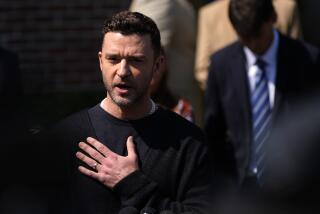Gibson uses plea deal to resolve case
Mel Gibson agreed to attend Alcoholics Anonymous meetings, perform public service announcements and pay $1,300 in fines as part of a plea agreement the actor reached Thursday with prosecutors to resolve his drunk driving charges.
Gibson was scheduled to be arraigned Sept. 28, but his attorneys informed prosecutors early Thursday that they were ready to make an immediate plea in Los Angeles County Superior Court in Malibu.
As a result, the proceeding occurred without intense media glare and was over in a matter of minutes.
The quick resolution means that the Gibson case is pretty much over, unless a judge finds that he violated the terms of the deal.
The agreement placed Gibson on three years of what is called “supervised probation,” meaning that he has to return to court periodically to show that he is abiding by the terms of his probation.
Gibson was not present for the hastily convened hearing in the courtroom of Judge Lawrence J. Mira, who has presided over several other cases involving celebrities such as Robert Downey Jr., Nick Nolte, Gary Busey and Charlie Sheen.
It was Gibson’s attorney, Blair Berk, who entered a plea of no contest to one misdemeanor count of driving with an alcohol level of 0.08% or above.
Two other charges, including driving under the influence of alcohol and driving with an open container of alcohol, were dropped as part of the deal.
Gibson, who has issued two public apologies for his behavior during the incident, must attend regular Alcoholics Anonymous meetings for a year, go into rehab treatment and have his license restricted for 90 days by the Department of Motor Vehicles.
He also volunteered to do a public service announcement on the hazards of drinking and driving and was fined $1,300.
Legal experts called the resolution fairly routine for a first-time DUI case in California that caused no injuries.
“The only departure from the standard terms are the AA meetings required by the court,” said Darren T. Kavinoky, a Woodland Hills-based defense attorney who specializes in drug and drunk driving cases. “But generally speaking, this settlement reflects a standard outcome.”
Kavinoky said prosecutors could have charged Gibson with additional crimes such as a “speed enhancement” for going 20 mph over the speed limit, which would require a two-month jail sentence. But he and others said such an enhancement was far from automatic in such cases.
Kavinoky praised Berk for protecting her client by “advancing the case,” having it resolved before the arraignment date, which probably would have attracted a flood of media attention.
By simply going into court and making the plea, Berk was able to “settle it outside the glare of the cameras,” he said.
A Los Angeles County sheriff’s deputy stopped Gibson last month on Pacific Coast highway after he spotted him driving his 2006 Lexus sedan over 85 mph. A breathalyzer test showed his blood-alcohol level to be 0.12% (the legal limit is 0.08%).
Sheriff’s officials initially described the arrest as “without incident.”
But after the celebrity website www.tmz.com obtained a sheriff’s arrest report detailing Gibson’s profane outbursts, attempt to escape custody and repeated threats to the arresting deputy, critics charged that the actor had received special treatment by authorities.
In his initial report, Sheriff’s Deputy James Mee described how Gibson “bolted” from custody and how he chased the actor back to Gibson’s car and handcuffed him.
In addition, the report detailed repeated threats against Mee made by Gibson, who said he “owned Malibu” and would “get even” with the deputy.
The report also detailed Gibson’s “barrage of anti-Semitic remarks,” in which he said, “The Jews are responsible for all the wars in the world,” before asking the deputy, who is Jewish: “Are you a Jew?”
Department officials decided to place that portion of the report under lock and key in an effort to prevent immediate public disclosure while only a narrative of the basic facts was made available to station personnel.
The sheriff’s Office of Independent Review is looking into whether details of Gibson’s behavior were kept from the media as a favor to the actor.
Considering the international attention the Gibson case has generated, the plea deal occurred with little fuss.
The judge could order additional progress reports from Gibson. And at some point, the actor’s attorneys could seek to have the case expunged from the record.
Times staff writers Richard Winton and Ashley Surdin contributed to this report.
More to Read
Sign up for Essential California
The most important California stories and recommendations in your inbox every morning.
You may occasionally receive promotional content from the Los Angeles Times.










